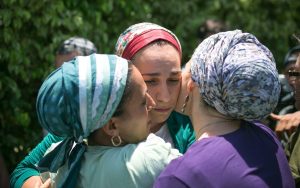
A TRIBUTE TO ISRAELI MOTHERS
By Ruthie Blum
In a well-deserved tribute, Rachel Frenkel, Bat-Galim Shaer and Iris Yifrach – the mothers of the three teenaged boys whose abduction and murder at the hands of Palestinian terrorists in the summer of 2014 sparked Operation Protective Edge in Gaza – were invited to light a torch at Israel’s Independence Day ceremony on May 9.
The annual event is held on Mount Herzl in Jerusalem, the site of the Israel’s national military cemetery. It takes place at the end of the day of mourning for all the country’s fallen soldiers and victims of terrorism, and marks the beginning of joyful birthday celebrations for the Jewish state, which turns 71.
The jarring juxtaposition of the somber and the sweet is purposeful. Before partying with nighttime fireworks and all-day barbecues, Israelis pause for a 24-hour period to commemorate, weep for and thank all the men, women and children killed either defending the nation from incessant enemy assault – or simply for going about their daily lives in the ancient Middle East homeland that they transformed into a flourishing Western democracy.
It is rare to find a family in Israel that has not been touched in some fashion by this particular form of bereavement. Indeed, funerals are just as much a part of the Israeli experience as weddings and baby-namings. And fear of losing one’s offspring in bombings, rocket-fire, car-rammings and stabbings is as present as anxiety about whether those same kids eat their broccoli or do their homework or find a suitable mate or get a good job. It is a country of Jewish mothers, after all.
Obviously, when the worst happens – as it did to Naftali Frenkel, Gil-Ad Shaer and Eyal Yifrach nearly five years ago – all the above is replaced by unfathomable grief. In some instances, it is erased by rage. The latter would certainly have been warranted in this case, as Gil-Ad had managed to phone 100, Israel’s emergency hotline number, and whisper a call for help. The botched response of the operator, whose yelling into the phone alerted the kidnappers, is thought to have contributed to the boys’ being shot dead on the spot.
 It was not until their bodies were found a full 18 days later that they were pronounced dead. In other words, for close to three weeks, their parents harbored hope that they were still alive.
It was not until their bodies were found a full 18 days later that they were pronounced dead. In other words, for close to three weeks, their parents harbored hope that they were still alive.
Rather than attempting to dissipate their devastation by wallowing in self-pity and casting blame in every direction, however, Rachel, Bat-Galim and Iris channeled it into an optimistic endeavor. Mere months after their personal tragedy, the three mothers partnered with then-Jerusalem Mayor Nir Barkat to honor their son’s lives by launching a cash prize to recognize the “efforts of organizations and individuals in Israel and the Diaspora who actively work to advance unity throughout Jewish communities and Israeli society.”
It is for this reason that Israeli Culture Minister Miri Regev made an exception to the current rule of having a maximum of two people light a single torch of the 12 that are ceremoniously lit on the eve of Independence Day, the theme of which this year is “Saluting the Israeli Spirit.”
Regev explained her decision by calling Rachel, Bat-Galim and Iris “the heroes of our spirit who, in the face of heart-piercing grief, chose to open a gate of the love of Israel to honor their loved ones.”
Regev was right, of course. But these women joining hands to wish their country a happy birthday straight from visiting their sons’ graves is a feat of internal strength that would better be described as other-worldly. For this, they should be granted a lot more than the opportunity to light a torch – a privilege that each would gladly forfeit in exchange for being able to hold her son in her arms one last time. Nevertheless, the three mothers-in-mourning accepted the invitation with grace and gratitude.
Meanwhile, across the ocean, Americans preparing for Mother’s Day on May 12 will be bustling around buying token boxes of chocolate and bouquets of flowers to thank their moms for being there. The best gift one can give a mother, however – as vicious terrorists forced Rachel Frenkel, Bat-Galim Shaer, Iris Yifrach and so many other Israelis to learn the hard way – is to stay alive and well.
 Ruthie Blum is a Tel Aviv-based American-Israeli journalist, lecturer and pundit focusing on politics and foreign affairs. The author of three books, most recently “To Hell in a Handbasket: Carter, Obama and the ‘Arab Spring,’” she is an editor at the Gatestone Institute, a columnist for the Jewish News Syndicate and the Jerusalem Post, and a regular panelist on i24News TV. Originally from New York City, she attended the University of Chicago and moved to Israel in 1977, where she received a degree in English literature from the Hebrew University in Jerusalem.
Ruthie Blum is a Tel Aviv-based American-Israeli journalist, lecturer and pundit focusing on politics and foreign affairs. The author of three books, most recently “To Hell in a Handbasket: Carter, Obama and the ‘Arab Spring,’” she is an editor at the Gatestone Institute, a columnist for the Jewish News Syndicate and the Jerusalem Post, and a regular panelist on i24News TV. Originally from New York City, she attended the University of Chicago and moved to Israel in 1977, where she received a degree in English literature from the Hebrew University in Jerusalem.
